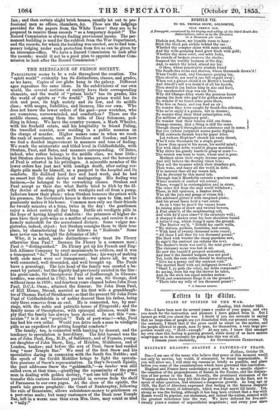EPISTLE VII.
TO MB.. THOMAS SNOW, GOLDSMITH,
:MAIL TIMPLE BAIL A Panegyric, occasioned by his buying and selling of the third So uth-Sca Subscriptions, taken in by the Directors
at a thousand per cent.
Disdain not, Snow, my humble verse to hear : Stick thy black pen awhile behind thy ear : . Whether thy eompter shine with sums untold, And thy wide-grasping hand grow black with gold; Whether thy mien erect, and sable locks, In crowds of brokers overawe the stocks ; Suspend the worldly business of the day, And, to enrich thy mind, attend my lay. (Amu, whose penetrative wisdom found The South-Sea rocks and shelves, where thousands drown'd ! When Credit sunk, and Commerce piping lay, Thou stood'st, nor sent'st one bill unpaid away ; When not a guinea chink'd on Martin's boards, And Atwell's self was drain'd of all his hoards, Thou stood'st (an Indian king in size and hue), Thy unexhausted shop was our Peru. Why did Change-Alley waste thy precious hours Among the fools who gap'd for golden showers ? No wonder if we found some poets there, Who live on fancy, and can feed on air ; No wonder they were caught by South-Sea schemes, Who ne'er enjoy'd a guinea, but in dreams ; No wonder they their third subscription sold, For millions of imaginary gold; No wonder that their fancies wild can frame Strange reasons, that a thing is still the same, Though chang'd throughout in substance and in name.
But you (whose judgment scorns poetic flights) With contracts furnish boys for paper kites. Let vulture Hopkins* stretch his rusty throat, Who'd ruin thousands for a single groat.
I know thou spurn'st his mean, his sordid mind; Nor with ideal debts would'st plague mankind. Why strive his greedy hands to grasp at more ?- The wretch was born to want, whose soul is poor.
Madmen alone their empty dreams pursue, And still believe the fleeting vision true ; They sell the treasure which their slumbers get, Then wake, and fancy all the world in debt.
If to instruct thee all my reason fail, Yet be diverted by this moral tale. Through fam'd Moorfields extends a spacious seat Where mortals of exalted wit retreat ; Where, wrapp'd in contemplation and in straw, The wiser few from the mad world withdraw ; There, in full opulence, a Banker dwelt, Who all the joys and pangs of riches felt : His sideboard glitter'd with imagined plate; And his proud fancy held a vast estate. As on a time he pass'd the vacant hours In raising piles of straw and twisted bowers, A Poet enter'd, of the neighbouring cell, And with sea eyes observ'd the structure well;
A sharpen'd skewer cross his bare shoulders bound.
A tatter'd rug, which dragg'd upon the ground. The Banker cry'd, "Behold my castle walls, "My statues, gardens, fountains, and canals, "With land of twenty thousand acres round; "All these I sell thee for ten thousand pound." The Bard with wonder the cheap purchase saw,
So sign'd the contract (as ordains the law).
The Banker's brain was cool'd, the mist grew clear ; The visionary scene was lost in air. He now the vanish'd prospect understood, And heed the fancied bargain was not good : Yet, loath the sum entire should be destroyed, "Give me a penny and thy contract void.' The startled Bard with eye indignant frown'd. "Shall I, ye gods (he cries), my debts compound!" So saying, from his rug the skewer he takes, And on the stick ten equal notches makes : With just resentment flings it on the ground- " There take my tally of ten thousand pound!"
• A famous usurer.


































 Previous page
Previous page